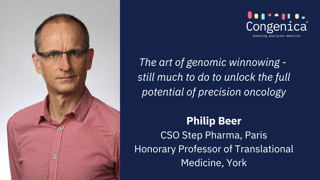Professor Andrew Biankin, the Regius Chair of Surgery and Director of the Wolfson Wohl Cancer Research Centre at the University of Glasgow, joined us for a webinar to share his insights and experience in transforming cancer care with genomic testing. In this blog post, we highlight key takeaways from his webinar.
Too many patients are still needlessly dying from cancer
Every year, 9.6 million cancer patients die because they run out of treatment options. Although biomarker-based drug candidates are becoming increasingly available, fewer than 1 in 100 patients have access to new treatments or clinical trials.
Sadly, most clinical trials fail to reach their target numbers of participants on time, and many trials are never completed. Moreover, most new drugs or treatments are never tested in most cancers and remain on the shelf. While we have sufficient drugs and treatments to double cancer survival, we only test a small fraction of these drugs and treatments in a fraction of cancer types and patients. So, the big question remains:
How can we do better and stop patients dying from cancer?
Genomic testing is key to improve patient outcomes
Precision medicine offers huge opportunities to re-evaluate our approach to treating cancer. While anti-cancer drugs can be effective in certain cases, traditional "one-size-fits-all" and "trial-and-error" methods are often failing - at great human, financial and emotional cost.
In order to identify the right treatment option for each patient, the adoption of genomic testing is crucial. However, for genomic testing to become part of routine clinical practice, it is important that the approaches are usable and scalable and deliver straight-forward reporting for clinicians. Currently there is substantial inequality of access to such tests, both within countries and between countries.
A significant challenge in recommending treatment options for cancer patients is the genetic diversity of tumors, even though they can appear similar under a microscope. If we want to be successful, we have to treat subgroups of patients based on the genetic profile of their tumour, and not the “average” patient.
By using NGS-based approaches coupled with multiplex testing, treatment options can be tailored to an individual’s genomic cancer profile, and the development of resistance to specific drugs can be monitored. NGS-based approaches also offer the possibility to test for larger numbers of genes simultaneously, rather than testing for mutations in single genes at a time. This not only accelerates the assessment of combinatory treatment options, but also significantly reduces emotional costs as well as costs to healthcare providers. Testing one gene at a time takes time, uses much more biopsy material and may require repeated invasive biopsies, not to mention the disappointment of waiting a month, only to learn that you’re not eligible for a treatment or a trial, and then repeat the process again for another single gene test.
Precision Medicine for every patient
Finally, for this approach to be successful and precision medicine become available to every patient around the globe, it is crucial to not only focus on wet lab requirements, but also establish streamlined NGS data analysis and interpretation pipelines that can be used by people without the need for software expertise. We also need easy-to-interpret reporting that focuses on actionable insights and supports rapid treatment decisions. We still rely too heavily on human expertise specifically when it comes to variant annotation and interpretation of NGS data, often resulting in subjective reporting and lengthy turnaround times. In addition, reporting is often still too complex, deterring from crucial information and potentially delaying treatment.
Together with Congenica, we are developing a future-proof, scalable and fully automated end-to-end solution that enables rapid and unbiased analysis of tumour profiling data coupled with automated, easy-to-interpret reporting. This will allow rapid and cost-effective personalised treatment recommendation, accelerated access to clinical trials and faster and more efficient development of new treatment options.
Sounds exciting? Listen to our webinar to learn more!
.png)
.png?width=960&height=541&name=Add%20a%20heading%20(1).png)


.png?width=320&height=192&name=Together%20Driving%20Precision%20Oncology%20(744%20%C3%97%20400%20px).png)
